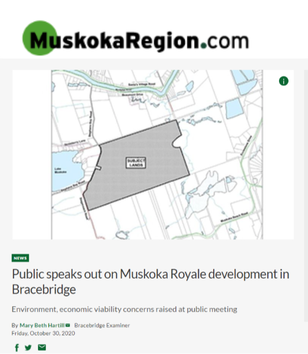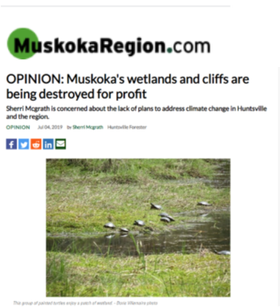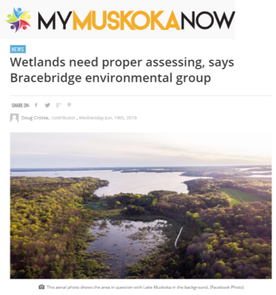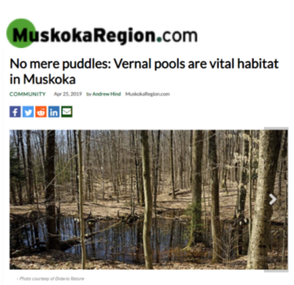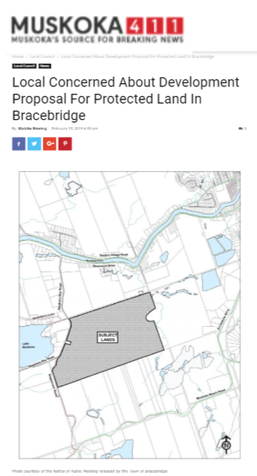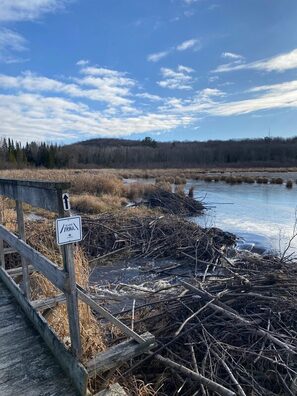
The $500,000 fight to protect a Muskoka wetland
Very few of Ontario’s quickly vanishing marshes and swamps are safe from development. A group of citizens managed to preserve one, but they also found deep flaws in the system By Emma McIntosh Nov. 29, 2023 11 min. read The story of a cottage country wetland in Bracebridge, Ont., shows the height of what a group of people who care can accomplish. It also shows how difficult Ontario's wetland protection system can be to navigate. If you’ve spent time in the rocky stretches of the Canadian Shield — where water often pools in stony hollows and wetlands can seem a dime a dozen — it can be hard to believe that the soggy landscapes left are just a fraction of what was here 150 years ago, before European settlers began filling them in. In southern Ontario in particular, about three-quarters of the wetlands that once existed are gone. Of the ones that remain, a vanishing few are protected from development. An even smaller number have been assessed to see if they’re worth preserving: just 30 in the past decade. Fewer still are bestowed with protective status at the end of the expensive, time-consuming assessment process, a title known as “provincially significant.” Only one site achieved the title from May 2021 to May 2022 — which is why it’s so remarkable that a group of citizens managed to secure it this year for a soggy site in Bracebridge, Ont., a stone’s throw from Lake Muskoka. Though the newly minted South Bracebridge Provincially Significant Wetland Complex shows the height of what a group of people who care can accomplish, the lengths they had to go to also show why the existing wetland protection system can seem impossible to navigate. The process required thousands of hours of volunteer work, a small army of hired experts and ultimately, half a million dollars. “How does the average person cough up the dough to fight something like this?” Michael Appleby, a director of the non-profit South Bracebridge Environmental Protection Group, said. “They don’t. The whole thing is stacked against them.” It’s a process that matters more than ever. Wetlands are a natural climate solution — they absorb carbon dioxide from the atmosphere. They provide a home for species at risk and soak up rain and melting snow that could otherwise cause floods. Even small or degraded ones have an outsized impact on their ecosystems. They’re also disappearing. Last year, Ontario’s auditor general concluded the province’s Ministry of Natural Resources and Forestry — which has made it harder to protect wetlands and abandoned a strategy aimed at conserving them — has done very little to prevent more from being filled in or paved over. Another member of the south Bracebridge group, Lisa Cumber, said advocates don’t exactly see an ally in the politician charged with overseeing Ontario’s wetland policy, Natural Resources Minister Graydon Smith. Before entering provincial politics, Smith was the mayor of Bracebridge, and voted in favour of allowing development near the wetland in 2021 without doing an assessment first. After the group appealed Bracebridge’s decision to a provincial tribunal, the project is going ahead but with stronger environmental protections. Smith’s office didn’t respond to questions from The Narwhal, including whether any other wetlands have been designated as provincially significant this year. Back in 2021, however, Smith said he didn’t take the decision to approve the development lightly. “It’s probably easy for people to say I’m being insincere when I say we’ve listened to the community and appreciated those comments but voted in a way that some people in the community don’t support, but such is the life of folks on council,” he told local media. So, what’s a would-be wetland protector to do? “The system is broken,” Cumber said. “The public has to keep pushing and pushing.” Bracebridge signed off on development without wetland evaluation Before they were a development battleground, the south Bracebridge provincially significant wetlands were best known as a hiking spot for cottagers and locals alike, brimming with life. In most seasons, birdsong echoes through the air — over the years, people have reported seeing 177 different avian species there — while frogs and turtles poke their heads out of the water. The Trans Canada Trail wraps around the public stretch of the wetland, known as Henry Marsh, which connects to other wetlands on the property that’s now set to be developed. It drains into the Muskoka River, which empties into Lake Muskoka, an iconic cottaging hotspot. The Town of Bracebridge, however, had decades ago earmarked the area around the wetland complex as part of its urban centre, meaning the properties around the trail could eventually be rezoned for development. A highway is set to be built there too, one day. Various people proposed various projects over the years, but nothing stuck — until 2018, when Toronto entrepreneur George Chen applied to the town to build a private boarding school there. Plans for the school, which will be called Muskoka Royale College, show a campus of about 180 hectares. It includes five “precincts” — classrooms, residences and a fitness complex, connected by roads winding through open space. When finished, it will be home to 1,800 students. Quinto Annibale, a lawyer representing Muskoka Royale who is also known for his work with the right-wing group Vaughan Working Families, told The Narwhal the developer planned the project as if the wetlands were provincially significant even before the official designation. Note: Since this article was published the SBEPG has appealed the decision of the member of the Ontario Land Tribunal and is awaiting the outcome of the leave to appeal. (Feb. 2024) |
|
TOWN ADMITS IT WAS WRONG IN MASSIVE PRIVATE SCHOOL Ontario Land Tribunal Hearing TOWN PLANNER ADMITS 15 METRE BUFFER IS A MISTAKE - HEARING ADJOURNS TO JANUARY 12, 2023
October 21, 2022 ** FOR IMMEDIATE RELEASE ** Bracebridge—A dramatic turn of events highlighted the end of the first phase of the Ontario Land Tribunal’s appeal of the proposed massive Muskoka Royale private school that, if built, would be the largest in Ontario. The South Bracebridge Environmental Protection Group Inc. (“Bracebridge Wetlands”) has appealed the Town of Bracebridge’s approval of the school location in a 179 hectare (approx. 442 acres) ecosystem covered in forest and significant wetlands. On Wednesday, October 19, 2022, the ecologist for the Town of Bracebridge, Dr. Andrea Smith, reversed herself under heavy cross-examination, admitting that it was preferable to have a uniform 30 metre buffer protecting the numerous wetlands on the 179 hectare (approx. 442 acres) site. She admitted in her evidence she could not find scientific literature justifying either a 15 metre buffer, or the proposed 30 metre “average” buffer, which is not regularly recommended by ecologists in Ontario, and recommended changing the proposed by-law under appeal. As a result, the Town’s planner Mr. Holmes admitted under cross-examination that the Town would no longer be supporting the requested 15 metre buffer to protect significant environmental features like wetlands and wildlife habitat – a major victory for environmentalists. Under cross-examination by legal counsel David Donnelly, the ecologist for Muskoka Royale Mr. Gord Nielsen admitted that the schools, dormitories, driveways, parking lots and sports facilities will necessitate the destruction of 36,000 – 50,000 trees and destroy the vegetation on an area of 28 hectares (approx. 69 acres), equivalent to thirty-three (33) football fields. “We’re thrilled with the results of the hearing so far and gratified that the truth has finally come out – 15 metre buffers are not acceptable for sensitive wetlands in Muskoka, as we’ve been saying to the Town all along”, said Michael Appleby of Bracebridge Wetlands. “We’re also extremely frustrated that it took an appeal and heavy cross- examination of these witnesses to speak the truth to the Town – there’s never been any scientific literature of practice of using small buffers in Ontario. That should have been the Town’s position from the beginning, not dragged out of their witnesses on the last day of their evidence, we’re paying for these witnesses”, he added. The unevaluated wetlands on the site are now the subject of a Ministry of Natural Resources and Forestry (“MNRF”) review, as Bracebridge Wetlands has long suspected they are Provincially Significant Wetlands. Despite numerous requests from Bracebridge Wetlands for this Ontario Wetland Evaluation System (“OWES”), the Town refused, even though the Ontario Government’s Natural Heritage Reference Manual, which states, “the planning authority [Town] should ensure a wetland evaluation is undertaken”. Under cross-examination, the wetland expert for Muskoka Royale admitted he thought the wetlands on site are Provincially Significant Wetlands. Inexplicably, despite being one of Bracebridge’s largest ever developments, Town Council did not have any evidence of how the loss of so many trees and vegetative cover would be consistent with the climate crisis, which every expert has called to date “an existential threat” to our planet. Under cross-examination, the planner for the Town admitted there was “no documentation” concerning climate adaptation, resiliency or mitigation provided to Council before it made its decision to approve the massive complex. On June 29, 2021, Bracebridge Council declared a “Climate Emergency”, and further formally committed to “adding a climate action perspective on all decision-making, large and small”. “Provincial policy and the Official Plans of both Bracebridge and the District of Muskoka all have strong policies on combating climate change, but none of these policies or climate change mitigation strategies we’ve presented to either Council, and that is shocking in this day and age”, said David Donnelly, counsel to Bracebridge Wetlands. “The Town’s own planner stated the development could potentially occur on one Precinct of approximately 10 hectares, instead of on five Precincts spread across 28 hectares, saving a lot of ecosystem damage that would also mean children could walk to school instead of taking a shuttle bus. To approve such a massive development, with an extraordinary loss of trees and vegetation without directly addressing climate change and how to do things better, in a more compact development, is a failure by Council and is very disturbing”, Donnelly added. In a pleasant surprise for residents who care about climate change, Mr. Nielsen testified the proposed “Bracebridge By-pass”, an approved highway that would skirt downtown Bracebridge, would be “destructive” to the Town. Mr. Nielsen is a long- time Bracebridge resident. Residents are hoping the entire property will be saved from the proposed “Five Precinct” school proposal and highway. The highway, approved by a Municipal Class Environmental Assessment in 2005, is scheduled to pass right through the Elementary School Precinct to be used by school children. Bizarrely, all the experts for Muskoka Royale and the Town were using the wrong map for years, which showed the By-pass avoiding the elementary school Precinct. Under cross-examination, the traffic engineer for Muskoka Royale admitted that the wrong map was being used to calculate road safety measures. Additional experts, including ecologists, servicing engineers and planners they had similarly used the wrong map. The hearing will resume ON January 12, 2023, when Bracebridge Wetlands will call their experts including a retired MNRF biologist, traffic engineer and planner. Closing arguments by all counsel will be on January 19, 2023 and all public are welcome to attend (links on Home page)to hear a summary of the issues at hand. The Tribunal Member will then render a decision. -30- Contact: Wendy Nicholson, Bracebridge Wetlands [email protected] Website: bracebridgewetlands.ca David Donnelly, legal counsel 416.722.0220 [email protected] |
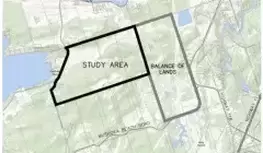
October 21, 2022 BRACEBRIDGE ADMITS ERRORS IN MUSKOKA ROYALE OLT HEARING THIS WEEK, BACKS DOWN ON WETLANDS BUFFER Mark Clairmont | MuskokaTODAY.com BRACEBRIDGE — Opponents of the Muskoka Royale private school proposal are claiming “a major victory for environmentalists” after Bracebridge’s town planner reversed course at an Ontario Land Tribunal (OLT) hearing this week. In a release Friday, the South Bracebridge Environmental Protection Group (SBEPG) (“Bracebridge Wetlands”) is calling the about face “a dramatic turn of events.” READ MORE HERE |
Bracebridge Citizen Accuses Former Mayor of Violating Endangered Species Act
BY ANDREW CRUICKSHANK PUBLISHED: JULY 5, 2022 in Cottage Life Magazine
Ontario’s new Minister of Natural Resources and Forestry is being accused of violating the Endangered Species Act.
On June 21, Bracebridge citizen Michael Opara charged Graydon Smith, the MPP for Parry Sound-Muskoka, with allegedly playing a role in endangering one of Ontario’s at-risk species, the Blanding’s turtle. The incident in question occurred during Smith’s tenure as Bracebridge, Ont.’s mayor, a position he held from 2010 to 2022.
Opara laid the charges three days before Ontario Premier Doug Ford announced Smith as one of his new cabinet ministers. Opara also brought charges against the town of Bracebridge, the town’s director of public works, Geoff Carleton, and the town’s chief administrative officer Stephen Rettie, all in relation to endangering Blanding’s turtles and their habitat.
Opara alleges that between June 8, and August 25, 2021, the town’s public works department disturbed a group of Blanding’s turtles, damaging their habitat by performing grading work on Peace Valley Road, where Opara lives. The site is a 15-minute drive northeast of Bracebridge.
Opara sent an email to the town on June 27, 2021, alerting Mayor Smith and a town councillor to the Blanding’s turtles in the area. Rather than putting a halt to the grading work, the public works department responded by changing the methodology, timing, and frequency of roadway operations where there was a risk of disturbing sensitive habitat, and erected turtle crossing signs in the area to advise equipment operators of the existing habitat, Bracebridge CAO Stephen Rettie wrote in a letter.
The charges have yet to be tested in court, but a Justice of the Peace did sign off on them, setting a court date for September 21 at the Bracebridge Courthouse.
In response to the allegations against the town of Bracebridge, Sarah Hahn, the town’s legal representative, wrote in an email that “these charging documents do not set out the details of any of the alleged offences and we are confident that they will be thrown out once a Justice of the Peace reviews the matter…The fact is, and the evidence will show, that the Town acted diligently and appropriately in completing required road works within the vicinity of the turtle habitat. It is unfortunate that town resources must now be used to respond to these baseless accusations.”
Despite repeated attempts to contact him, Graydon Smith did not respond to a request to comment on the allegations by the time of publishing this article.
David Donnelly, an environmental lawyer based in Toronto, says that the Justice of the Peace signing off on the charges and setting a court date proves that there is legitimacy to the charges. “The Justice of the Peace cannot and should not swear any information or issue process in cases that are lacking evidence,” Donnelly says. Donnelly is not involved in the Bracebridge case but has participated in similar prosecutions, many of which have proved to be successful and resulted in changes to the law.
Once the accused appears in court on September 21, it is possible that charges could be dropped, if the individuals, such as Smith, can demonstrate that they weren’t involved in the decision-making relevant to the case, Donnelly says. “But under the Endangered Species Act, it’s important that anyone who was responsible for the actual act or the decision making leading to the destruction of the endangered species be held accountable,” Donnelly says.
BY ANDREW CRUICKSHANK PUBLISHED: JULY 5, 2022 in Cottage Life Magazine
Ontario’s new Minister of Natural Resources and Forestry is being accused of violating the Endangered Species Act.
On June 21, Bracebridge citizen Michael Opara charged Graydon Smith, the MPP for Parry Sound-Muskoka, with allegedly playing a role in endangering one of Ontario’s at-risk species, the Blanding’s turtle. The incident in question occurred during Smith’s tenure as Bracebridge, Ont.’s mayor, a position he held from 2010 to 2022.
Opara laid the charges three days before Ontario Premier Doug Ford announced Smith as one of his new cabinet ministers. Opara also brought charges against the town of Bracebridge, the town’s director of public works, Geoff Carleton, and the town’s chief administrative officer Stephen Rettie, all in relation to endangering Blanding’s turtles and their habitat.
Opara alleges that between June 8, and August 25, 2021, the town’s public works department disturbed a group of Blanding’s turtles, damaging their habitat by performing grading work on Peace Valley Road, where Opara lives. The site is a 15-minute drive northeast of Bracebridge.
Opara sent an email to the town on June 27, 2021, alerting Mayor Smith and a town councillor to the Blanding’s turtles in the area. Rather than putting a halt to the grading work, the public works department responded by changing the methodology, timing, and frequency of roadway operations where there was a risk of disturbing sensitive habitat, and erected turtle crossing signs in the area to advise equipment operators of the existing habitat, Bracebridge CAO Stephen Rettie wrote in a letter.
The charges have yet to be tested in court, but a Justice of the Peace did sign off on them, setting a court date for September 21 at the Bracebridge Courthouse.
In response to the allegations against the town of Bracebridge, Sarah Hahn, the town’s legal representative, wrote in an email that “these charging documents do not set out the details of any of the alleged offences and we are confident that they will be thrown out once a Justice of the Peace reviews the matter…The fact is, and the evidence will show, that the Town acted diligently and appropriately in completing required road works within the vicinity of the turtle habitat. It is unfortunate that town resources must now be used to respond to these baseless accusations.”
Despite repeated attempts to contact him, Graydon Smith did not respond to a request to comment on the allegations by the time of publishing this article.
David Donnelly, an environmental lawyer based in Toronto, says that the Justice of the Peace signing off on the charges and setting a court date proves that there is legitimacy to the charges. “The Justice of the Peace cannot and should not swear any information or issue process in cases that are lacking evidence,” Donnelly says. Donnelly is not involved in the Bracebridge case but has participated in similar prosecutions, many of which have proved to be successful and resulted in changes to the law.
Once the accused appears in court on September 21, it is possible that charges could be dropped, if the individuals, such as Smith, can demonstrate that they weren’t involved in the decision-making relevant to the case, Donnelly says. “But under the Endangered Species Act, it’s important that anyone who was responsible for the actual act or the decision making leading to the destruction of the endangered species be held accountable,” Donnelly says.
Muskoka Royale fight heads to the next level
BY MATT DRISCOLL ON SEPTEMBER 8, 2021
Despite approval by the municipality earlier this year to proceed with the proposed Muskoka Royale College, opponents are still hoping they can put the brakes on the project as it heads to the Ontario Land Tribunal later this month.
In January the Town of Bracebridge approved rezoning of the 450-acre site, which is located just east of Stephen’s Bay, to open the door for construction of a boarding school.
The developer, George Chen, says that on full build-out, Muskoka Royale College will accommodate up to 1,800 students over a gradual period of 15-20 years. He says the development of this school is expected to provide the equivalent of 200 full-time construction jobs over a five-year period, and 120 full-time, permanent professional jobs in teaching and administration and other positions.
However, opponents of the project claim it is being built in an environmentally sensitive wetland area which could have catastrophic results for the local ecosystem.
“The politicians are going in a way that’s contrary to the way the science is pointing,” says Michael Appleby, who helped found the South Bracebridge Environmental Protection Group (SBEPG). The group formed when the proposal first came to light and they have since collected more than 5,000 signatures opposed to the development, says Appleby.
“I’m a science-based person. I rely on facts and it’s stunning to me that none of the information sent to the council was given any weight. It’s stunning on one level and sad on another,” he says.
In September, 2017, Michalski Nielsen Associates Limited was retained by Muskoka Royale Developments Inc. to update their previous natural environment work on the westerly half of the Muskoka Royale property, in support of the development of a senior school and future elementary school campus. They concluded that the proposal was appropriate for the area in both scale and intensity. Appleby says that study was deeply flawed.
“Consider that the subject lands have documented 204 species, with seven of those species on the Endangered Species list, but because their habitat locations are still unknown, the impact from any site development cannot be clearly understood,” said Appleby in a letter to Town council. He also points to letters of support from Ontario Nature and Barry Warner, a professor of Earth and environmental sciences at the University of Waterloo.
After the town decided to approve the project earlier this year, the SBEPG filed an appeal with the Ontario Land Tribunal for both the rezoning approval by the Town of Bracebridge and the District of Muskoka’s change to the Official Plan Amendment. The Case Management Conference has now been set for September 20, 2021 at 10 a.m. by video conference.
In January the Town of Bracebridge approved rezoning of the 450-acre site, which is located just east of Stephen’s Bay, to open the door for construction of a boarding school.
The developer, George Chen, says that on full build-out, Muskoka Royale College will accommodate up to 1,800 students over a gradual period of 15-20 years. He says the development of this school is expected to provide the equivalent of 200 full-time construction jobs over a five-year period, and 120 full-time, permanent professional jobs in teaching and administration and other positions.
However, opponents of the project claim it is being built in an environmentally sensitive wetland area which could have catastrophic results for the local ecosystem.
“The politicians are going in a way that’s contrary to the way the science is pointing,” says Michael Appleby, who helped found the South Bracebridge Environmental Protection Group (SBEPG). The group formed when the proposal first came to light and they have since collected more than 5,000 signatures opposed to the development, says Appleby.
“I’m a science-based person. I rely on facts and it’s stunning to me that none of the information sent to the council was given any weight. It’s stunning on one level and sad on another,” he says.
In September, 2017, Michalski Nielsen Associates Limited was retained by Muskoka Royale Developments Inc. to update their previous natural environment work on the westerly half of the Muskoka Royale property, in support of the development of a senior school and future elementary school campus. They concluded that the proposal was appropriate for the area in both scale and intensity. Appleby says that study was deeply flawed.
“Consider that the subject lands have documented 204 species, with seven of those species on the Endangered Species list, but because their habitat locations are still unknown, the impact from any site development cannot be clearly understood,” said Appleby in a letter to Town council. He also points to letters of support from Ontario Nature and Barry Warner, a professor of Earth and environmental sciences at the University of Waterloo.
After the town decided to approve the project earlier this year, the SBEPG filed an appeal with the Ontario Land Tribunal for both the rezoning approval by the Town of Bracebridge and the District of Muskoka’s change to the Official Plan Amendment. The Case Management Conference has now been set for September 20, 2021 at 10 a.m. by video conference.

Controversial proposed boarding school in Bracebridge heading to tribunal
Having passed through both Town of Bracebridge and District of Muskoka councils, the rezoning and official plan amendment for the Muskoka Royale project is being appealed to the Local Planning Appeal Tribunal. This is what Bracebridge Mayor Graydon Smith had anticipated would happen when the decision was made at town’s planning and development committee with the expectation of ratification at the Jan. 20 council meeting...READ MORE HERE
By Mary Beth Hartill - Reporter - Fri., May 28, 2021
Having passed through both Town of Bracebridge and District of Muskoka councils, the rezoning and official plan amendment for the Muskoka Royale project is being appealed to the Local Planning Appeal Tribunal. This is what Bracebridge Mayor Graydon Smith had anticipated would happen when the decision was made at town’s planning and development committee with the expectation of ratification at the Jan. 20 council meeting...READ MORE HERE
By Mary Beth Hartill - Reporter - Fri., May 28, 2021
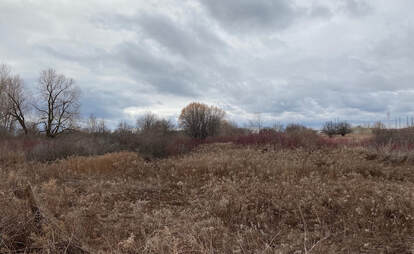
EVEN AMAZON KNOWS IT IS WRONG TO BUILD ON A WETLANDS!
Amazon says it's not building new warehouse on Pickering wetlands citing environmental concerns
BY LUCAS CASALETTO Posted Mar 12, 2021 4:04 pm EDT
NDP leader Andrea Horwath says the decision by Amazon is the right one but the fight isn’t over. “You don’t bulldoze a wetland to build a warehouse,” said Horwath. “… We need the Doug Ford MZO scrapped – or this vital wetland remains at risk of being paved over for whatever the highest bidder wants to build there.”
Liberal leader Steven Del Duca says everyone except the Ford government gets that destroying our natural environment is bad economic policy.
Green Party leader Mike Schreiner said, “even Amazon recognizes it’s wrong to build a warehouse on provincially significant wetlands.
CLICK HERE TO READ FULL ARTICLE
Amazon says it's not building new warehouse on Pickering wetlands citing environmental concerns
BY LUCAS CASALETTO Posted Mar 12, 2021 4:04 pm EDT
NDP leader Andrea Horwath says the decision by Amazon is the right one but the fight isn’t over. “You don’t bulldoze a wetland to build a warehouse,” said Horwath. “… We need the Doug Ford MZO scrapped – or this vital wetland remains at risk of being paved over for whatever the highest bidder wants to build there.”
Liberal leader Steven Del Duca says everyone except the Ford government gets that destroying our natural environment is bad economic policy.
Green Party leader Mike Schreiner said, “even Amazon recognizes it’s wrong to build a warehouse on provincially significant wetlands.
CLICK HERE TO READ FULL ARTICLE
Public speaks out on Muskoka Royale development in Bracebridge - October 30, 2020
How important is that Muskoka wetland? - November 4, 2019
No mere puddles: Vernal pools are vital habitat in Muskoka - April 25, 2019
STAY INFORMED |
APPEAL AT OLT:Thank you to all who listened to our Appeal. We now await the decision by the Ontario Land Tribunal Member and Vice-Chair Hugh Wilkins.
Please support our costs for legal defense fund for the appeal at the Ontario Land Tribunal to preserve these natural heritage lands. CLICK HERE TO DONATE to the SMALL CHANGE FUND Charitable Donation Tax Receipts will be issued. THANK YOU! |
The South Bracebridge Environmental Protection Group Inc (SBEPG) is a registered non-profit corporation.
Contact us at [email protected]
Contact us at [email protected]
Copyright South Bracebridge Environmental Protection Group 2019-2023.

